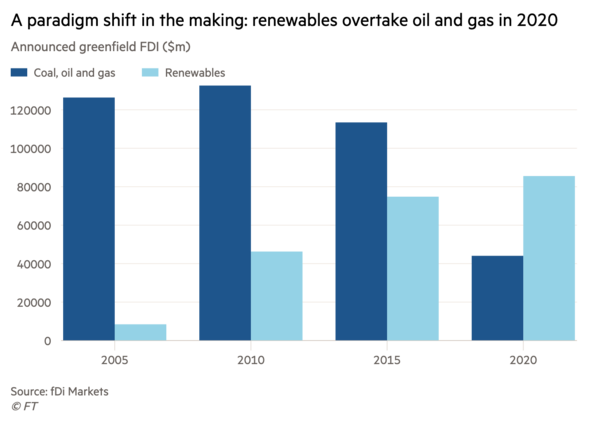Last year was a tipping point in the green transition, with renewables avoiding the 40% slump in global foreign direct investment (FDI) and low oil prices intensifying energy majors’ attention on diversification.
In 2020, greenfield foreign investment in renewables exceeded flows into fossil fuels for the first time on record, according to investment monitor fDi Markets. Renewables FDI totaled $85.5bn, down 11.2% from 2019, while greenfield investment into coal, oil and gas plunged nearly 62.3% to around $44.1bn.
Advertisement
“We see 2020 as a turning point in the energy transition” said Edurne Zoco, executive director for clean technology and renewables at IHS Markit. The firm’s data shows that global capital expenditure in renewables (excluding hydropower) was up 2% on 2019, suggesting that FDI is just one part of the sector’s broader resilience to the pandemic.
This resilience is explained in part by its independence from fuel prices, which collapsed in 2020 as lockdowns dried up demand and a spat between oil-producing countries led to a glut of supply. Another driver is clean energy’s growing cost-competitiveness. “The steadily declining capital cost of renewables makes capital increasingly efficient,” says Ms Zoco, noting that the 14% growth in Capex which IHS Markit anticipates over the next five years could represent over 50% growth in installed capacity.
But what really propelled the sector through 2020 was investors’ long-term commitment to transitioning toward a low-carbon economy. “When this started we asked ourselves if Covid-19 was an opportunity or a challenge for renewables development,” said Ms Zoco. “Obviously we can’t neglect the impact of the pandemic over the last year. But the reality is there is liquidity in the market, and [there is] strong demand for renewable and other cleantech companies and assets which are looking like a good bet for many investors.” She admits renewables investment in 2020 held-up better than initially expected.
Greenfield FDI into European renewables grew nearly 70%. This was driven by the UK, France, Poland, Portugal, Italy and Ireland, which collectively nearly trebled their 2019 levels by attracting $30.2bn of investment. Further east, Japan, Vietnam and China made gains too, although the latter is exclusively down to a project by Hong Kong-based Panda Green Energy Group.
No direct trade off
Advertisement
2020 was a pivotal year in the green transition for other reasons, too. The EU, China, South Korea and Japan all announced net-zero emissions targets, along with oil majors such as Total, BP and Shell. Meanwhile, renewables overtook fossil fuels as the EU’s main source of electricity.
But analysts warn against reading too much into the fact that fossil fuels’ and renewables’ fortunes have diverged throughout the pandemic. Wood Mackenzie’s head of upstream analysis, Fraser McKay, says the circa-30% drop in upstream oil and gas expenditure in 2020, as revealed by the firm’s Lens platform, was “entirely” caused by the collapse in prices.
Low oil prices and concerns about long-term demand will, however, accentuate energy transition considerations when petroleum firms start to reinvest. “These factors have been gaining prominence in how companies approach new investments and strategies, and there is nothing like a downturn to focus the minds of the people who matter in the industry on sustainability and resilience,” said Mr McKay.
Their immediate focus will be on short-term investments. “Anything that doesn’t return any cash relatively quickly or has a long life is very difficult to think about at the moment,” he said. Fossil fuels are expected to bounce back, but IHS Markit expects cumulative investments in 2021–2025 to be 20% lower than 2015–2019 levels.
For oil majors, last year’s reminder of the urgency with which they should be diversifying could not have been more timely. “To reach any 2050 target you will need to make major investments in the next 10 years. That is clear,” said Ms Zoco.
